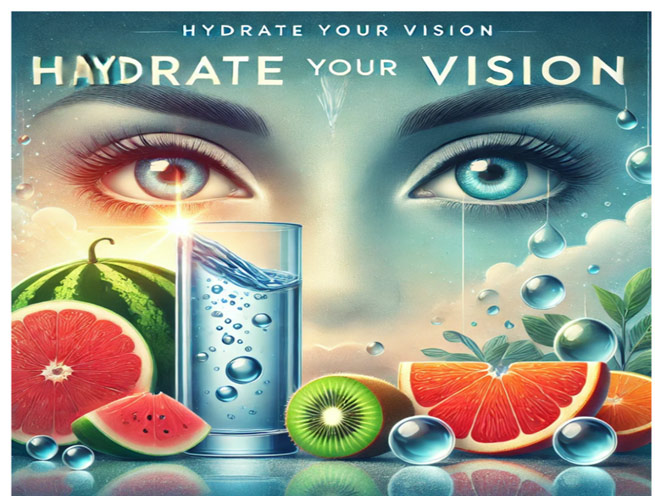Introduction
Hydration plays a critical role in maintaining the health of the eyes. The body’s overall hydration status can directly and indirectly affect the eyes. Here’s how dehydration can impact eye health:

Dry Eyes
- Tear Production: The eyes rely on a thin film of tears to stay lubricated. When the body is dehydrated, tear production can decrease, leading to dry eyes. This may cause discomfort, irritation, redness, or a gritty eye feeling.
- Tear Composition: Dehydration can affect the composition of tears, making them more unstable and less effective at keeping the eyes moist.
- Eye Fatigue
- Reduced Moisture: Without adequate hydration, the eyes may become more prone to fatigue, especially after long periods of focus, such as reading, working at a computer, or driving. Dehydration can impair the eye’s ability to stay lubricated during such activities.
- Increased Blinking: Dehydrated eyes may prompt more frequent blinking, which can be uncomfortable or cause eyes to feel strained.
- Eye Infections
- Weakened Defense Mechanisms: The eyes’ natural defence against infection depends on a steady moisture supply to wash away potential irritants and pathogens. Dehydration can reduce this protective barrier, increasing the risk of conditions like conjunctivitis (pink eye).
- Vision Changes
- Blurred Vision: Dehydration may lead to temporary blurry vision due to the reduced volume of fluid available to maintain the shape and structure of the eye. This could affect the cornea and lens, both important for correctly focusing light.
- Increased Sensitivity: Dry eyes are more prone to irritation and can be more sensitive to light, potentially making vision uncomfortable in bright conditions.
- Increased Risk of Eye Diseases
- Chronic dehydration, if not addressed, can contribute to long-term eye issues, such as:
- Glaucoma: Dehydration can lead to imbalances in the eye’s fluid pressure, potentially increasing the risk of conditions like glaucoma, which affects the optic nerve.
- Cataracts: Long-term dehydration may affect the lens, increasing the risk of clouding (cataracts) over time.
- Impact on the Conjunctiva
- Conjunctival Dryness: The conjunctiva, the thin membrane covering the white part of the eye, relies on moisture to remain healthy. Dehydration can lead to dryness and irritation in this area, contributing to discomfort and increased sensitivity.
- Increased Risk of Eye Strain
- Fatigue and Headaches: Dehydration can contribute to general fatigue, including eye strain. When the eyes are not adequately hydrated, focusing becomes more complex, leading to tension and headaches, often exacerbated by tasks requiring visual concentration.
How to Maintain Hydration for Eye Health:
- Drink Adequate Water: Ensure you drink enough fluids throughout the day. The general recommendation is around eight glasses (2 litres) of water per day, but individual needs can vary.
- Balanced Diet: Consume a diet rich in water-containing foods like fruits and vegetables (e.g., cucumbers, watermelon, and oranges) to support hydration.
- Humidify Your Environment: Dry indoor air can worsen eye dehydration, especially in heated or air-conditioned spaces. Using a humidifier can help prevent excessive moisture loss.
- Rest and Blink Regularly: Proper rest, significantly during activities like reading or using screens, can help reduce eye strain, while regular blinking helps spread the tear film across the eye’s surface.
Maintaining good hydration can help ensure your eyes stay healthy, comfortable, and adequately lubricated. Consult an eye care professional if you experience persistent eye dryness or discomfort.




